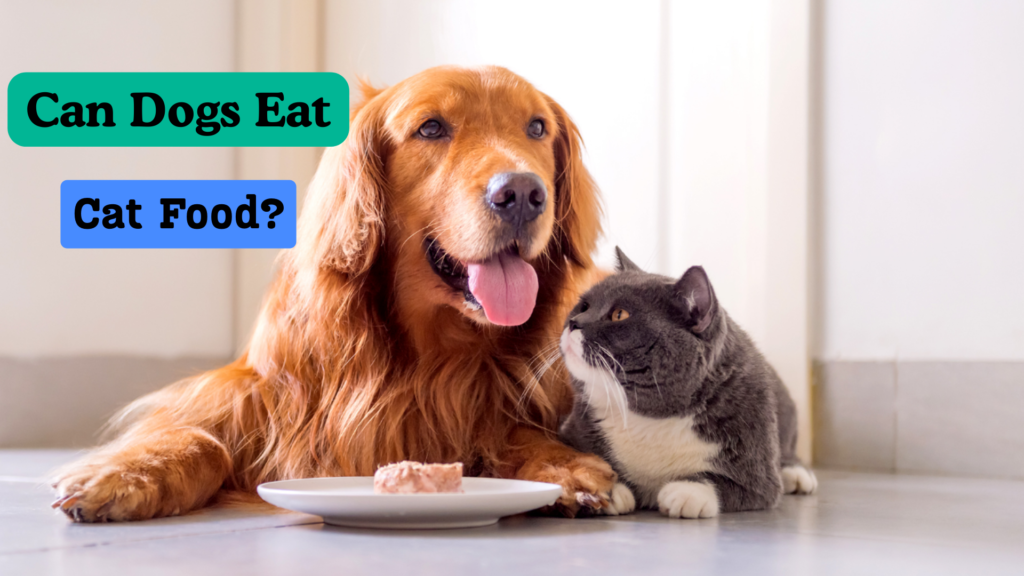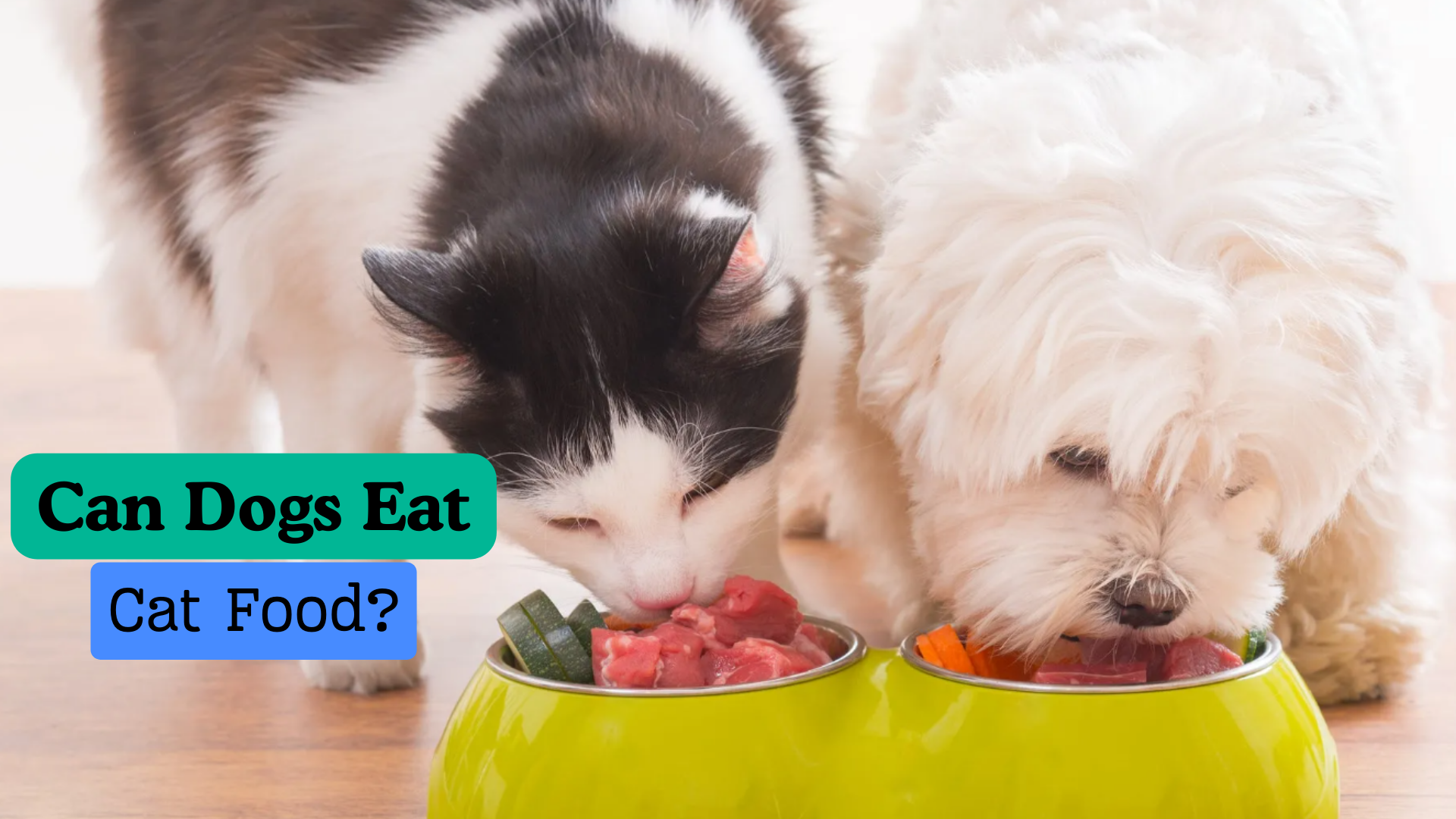Introduction
Have you ever caught your furry friend sneaking a taste of the cat’s food? While it may seem harmless, the question of can dogs eat cat food is an important one for pet owners to consider.
In this detailed guide, we’ll explore the complexities of dog and cat nutrition, the potential risks and benefits of dogs eating cat food, and how to prevent this common dietary issue. Let’s dive in and uncover the facts that every pet owner should know.
Jump to Section
Can Dogs Eat Cat Food?
Understanding Dog Nutrition
When it comes to our furry friends, it’s important to understand that dogs and cats have different nutritional needs. While both are beloved pets, they have evolved differently and therefore require different diets to thrive. In this section, we will delve deeper into the nutritional needs of dogs and how they differ from cats.
Protein
Dogs require a higher amount of protein in their diet compared to cats, as they have a higher muscle mass and energy needs.
Good sources of protein for dogs include:
- Meat (chicken, beef, lamb, etc.)
- Fish (salmon, tuna, sardines, etc.)
- Eggs
- Dairy products (yogurt, cheese, etc.)
- Plant-based proteins (beans, lentils, etc.)
Carbohydrates
Carbohydrates provide dogs with energy and are an important source of fiber, which aids in digestion. Too many carbohydrates can lead to weight gain and other health issues.
Good sources of carbohydrates for dogs include:
- Whole grains (brown rice, oats, etc.)
- Fruits (apples, bananas, etc.)
- Veggies (carrots, sweet potatoes, etc.)
Fats
Fats are a concentrated source of energy for dogs and are essential for the absorption of fat-soluble vitamins. However, it’s important to choose healthy sources of fat for your dog’s diet, as too much can lead to obesity and other health issues.
Good sources of fat for dogs include:
- Animal fats (chicken fat, fish oil, etc.)
- Plant-based oils (coconut oil, olive oil, etc.)
- Fatty fish (salmon, sardines, etc.)
Unlike dogs, cats are classified as obligate carnivores, meaning they require a diet that consists primarily of animal-based proteins. This is due to their evolutionary history as hunters and their unique nutritional needs.
Dietary Needs of Cats
Cats have a higher requirement for protein in their diet compared to dogs, as they have a higher need for amino acids, which are the building blocks of protein. They also require certain nutrients, such as taurine and arachidonic acid, which are only found in animal-based proteins.
Good sources of protein for cats include:
- Meat (chicken, beef, lamb, etc.)
- Fish (salmon, tuna, sardines, etc.)
- Eggs
Now that we understand the different nutritional needs of dogs and cats, it’s clear why cat food is not suitable for dogs. Cat food is specifically formulated for the unique needs of cats, which includes a higher amount of protein and certain nutrients that dogs do not require in the same amounts.
Risks of Dogs Eating Cat Food
While it may seem harmless for your dog to sneak a few bites of cat food, it can actually have negative effects on their health in the long run. Here are some of the risks associated with dogs eating cat food:
- Potential for Nutritional Imbalance: Cat food is formulated specifically for the nutritional needs of cats, which differ from those of dogs. While dogs require a balanced diet of protein, carbohydrates, and fats, cats have a higher protein and fat requirement. This means that regular consumption of cat food can lead to imbalances in a dog’s diet, potentially causing deficiencies in essential nutrients.
- Strain on Digestive System: The high protein and fat content in cat food can put a strain on a dog’s digestive system. Dogs are not equipped to handle such a high amount of protein and fat, which can lead to digestive issues such as diarrhea, vomiting, and pancreatitis.
- Potential for Weight Gain: Due to the higher fat content in cat food, regular consumption can lead to weight gain in dogs. This can be especially problematic for dogs who are already overweight or prone to obesity.
- Possible Kidney and Liver Damage: The high protein content in cat food can also put a strain on a dog’s kidneys and liver. Over time, this can lead to damage and potential health issues for your dog.
It’s important to note that these risks are more likely to occur with regular consumption of cat food. An occasional nibble here and there may not cause any immediate harm, but it’s best to avoid making it a regular part of your dog’s diet.

How to Prevent Dogs from Eating Cat Food
Feeding Routine for Dogs and Cats
Establishing a consistent feeding routine for both dogs and cats is crucial in preventing canine access to cat food. This not only ensures that your pets are getting the proper nutrition they need, but also helps maintain a peaceful and harmonious household.
In this section, we will discuss the importance of a feeding routine and provide tips on how to create one for your furry friends.
- Prevents food sharing: Dogs are notorious for trying to sneak a bite of their feline sibling’s food. By establishing a feeding routine, you can ensure that each pet is getting their own designated meal without any interference from the other.
- Promotes good eating habits: Just like humans, pets thrive on routine. By feeding them at the same time every day, they will learn when to expect their meals and develop a healthy eating schedule.
- Reduces mealtime conflicts: If your pets have a designated feeding area, it can help prevent any potential conflicts that may arise during mealtime. This is especially important for households with multiple pets.
Here is an example of a feeding routine for a household with a dog and a cat:
Time Activity
7:00 AM Dog’s breakfast in the kitchen, 7:30 AMCat’s breakfast in the living room, 5:00 PM Cat’s dinner in the living room 5:30 PM Dog’s dinner in the kitchen. Remember, every pet is different and may have different feeding needs. It’s important to adjust the routine to fit your pet’s individual needs.
- Stick to a schedule: Once you have established a feeding routine, try to stick to it as much as possible. This will help your pets adjust and maintain a healthy eating schedule.
- Monitor portion sizes: It’s important to monitor your pet’s portion sizes to ensure they are getting the right amount of food. Overfeeding can lead to obesity and other health issues.
- Provide fresh water: Along with a consistent feeding routine, it’s important to provide your pets with fresh water at all times.
What to Do if Your Dog Eats Cat Food
Signs of Cat Food Ingestion in Dogs
It is common for dogs to occasionally eat cat food, but it is important to discourage this behavior. While dogs and cats may seem similar, their dietary needs and digestive systems are quite different. Consuming cat food can lead to various health issues for dogs, so it is important to be aware of the signs and symptoms of cat food ingestion in dogs.
If your dog has had access to cat food, it is important to monitor their health and behavior closely. This can help in early detection of any adverse effects and allow you to take prompt action. Some things to watch out for include:
- Changes in appetite or refusal to eat
- Changes in bowel movements (e.g. diarrhea, constipation)
- Excessive drooling
- Abdominal discomfort or bloating
- Excessive gas
- Changes in coat or skin (e.g. dryness, itching)
If you notice any of these signs or symptoms, it is important to take immediate action to help your dog feel better and prevent any further complications.
If your dog has consumed cat food and is showing signs of discomfort or illness, there are a few things you can do to help them feel better:
- Offer Plenty of Water: Make sure your dog has access to clean, fresh water at all times. This can help prevent dehydration and flush out any toxins from the cat food.
- Limit Food Intake: If your dog is experiencing gastrointestinal upset, it may be best to limit their food intake for a day or two. This will give their digestive system a chance to rest and recover.
- Stick to a Bland Diet: When you do start feeding your dog again, stick to a bland diet of boiled chicken and rice. This will be easier for their stomach to digest and help soothe any inflammation.
- Consult Your Veterinarian: If your dog’s symptoms persist or worsen, it is important to consult your veterinarian. They can provide further guidance and treatment options to help your dog recover.
In some cases, consuming cat food can lead to more serious health issues in dogs. If your dog is experiencing any of the following symptoms, it is important to seek veterinary care immediately:
- Severe vomiting or diarrhea that lasts for more than 24 hours
- Bloody or black stools
- Difficulty breathing
- Seizures
- Loss of consciousness
These symptoms could indicate a more serious condition that requires immediate medical attention.
Conclusion
In conclusion, while dogs may be tempted by the enticing aroma of cat food, it’s essential for pet owners to prioritize their pets’ individual nutritional needs. Understanding the differences in dog and cat nutrition, implementing effective prevention strategies, and providing appropriate alternatives are key in ensuring the well-being of dogs.
By prioritizing the right diet and proactive care, pet owners can safeguard their canine companions from the potential risks associated with consuming cat food. Ultimately, responsible pet care involves making informed choices to support the health and happiness of our beloved pets.

